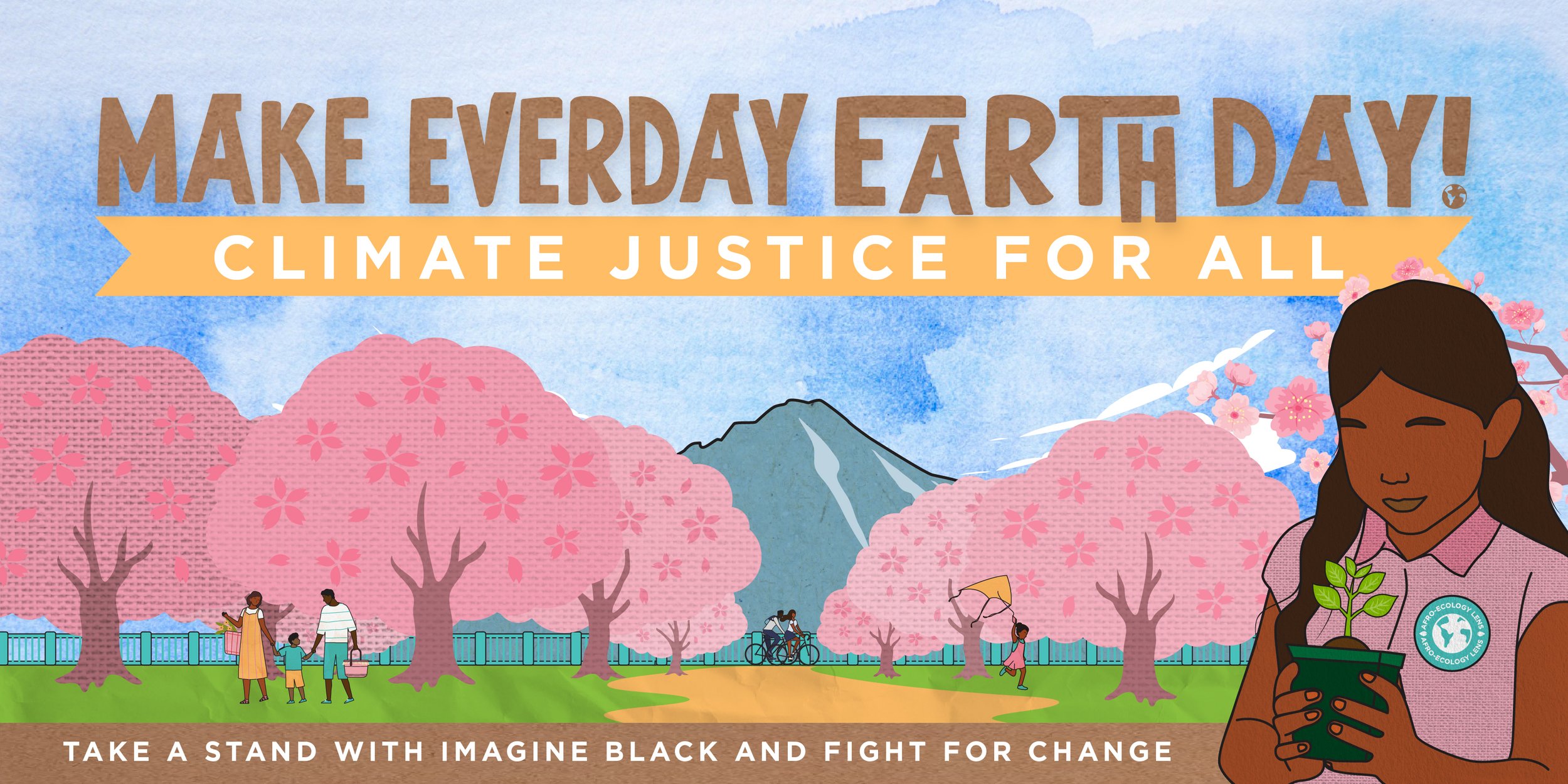ENVIRONMENTAL AND CLIMATE JUSTICE
We all love different aspects of the wondrous world we live in, whether it’s the beautiful hikes, sandy beaches, hitting the ski slopes, or simply walking down the road to your neighborhood park. However, many Black communities aren’t as fortunate. It’s up to all Oregonians to take a stand with Imagine Black to fight for what is right.
Let’s make everyday Earth Day and build a better future for Black Oregonians!
The solution to the environmental and social issues facing Black Oregonians is the Afro Ecology Lens. By centering Black prosperity and tackling institutional displacement and disinvestment, we can build and advance relevant solutions for our community!
There are a number of ways to advance this work. One of the easiest is to sign Imagine Black’s Afro Ecology Pledge or to donate to our organization.
THE AFRO ECOLOGY LENS
The Afro Ecology lens is centered on Black prosperity and pushes beyond the narrow focuses of traditional conversations around sustainability. With this lens, we can assess opportunities and threats that impact not only our environmental health but the health and spirit of our communities.
Your contributions will help us build
Together we can create a future that ensures all Black and marginalized communities have:
Take a deeper dive into Climate and Environmental Justice
Racist institutional practices and policies have historically, and currently, left Black people disempowered, disenfranchised, and disinherited from the benefits of a healthy environment and sustainable programs and policies. In order to protect future generations of Black Oregonians, the Black community must participate in addressing climate change and issues of environmental justice right now.
Through a Black Queer Feminist lens, we promote human and environmental well-being by not only engaging but centering, people from historically underrepresented groups to develop and advocate for relevant solutions to environmental and social issues facing their communities -- in this case, the Black community.
We represent and work deeply in a community that faces tremendous environmental harm. Those harms include disparate health impacts from poor air quality that results from diesel, woodsmoke, and industrial pollution, vulnerability to increases in temperature due to climate change, and reduced access to green spaces. These environmental impacts are exacerbated by racial disparities in wealth, employment, access to healthcare, education, and access to affordable housing.
THE AFRO ECOLOGY LENS CONTINUED
When we apply an Afro Ecology Lens:
We organize and activate the Black community on relevant environmental and climate issues, building on the Afro-Ecology Movement Framework currently under development.
We educate members of the Black community around environmental and climate justice issues, and meaningfully influence policies that directly impact the black community, from diesel air emissions to GHG pricing policies.
We build toward a movement addressing the root causes of both environmental degradation and racism.
We sustain the vision of a thriving and connected, resilient Black community. (PAALF People’s Plan, Environmental Justice Section, 2017)
Reclamation of African ancestral ecological self-concept, including connection to spirit, land, and people, which serves to give us direction, esteem, and confidence.
Deconstruction of oppressive systems and environmental tools that serve to divide and disconnect us from each other and nature by reinforcing scarcity, isolation, and erasure.
Advancement of opportunities that improve our well-being, create resilient Black communities and facilitate our connection to the land, the waterways, food systems, and each other.
ENVIRONMENTAL AND CLIMATE JUSTICE INITIATIVES
AFRO-ECOLOGY VOTER PLEDGE
As climate justice advocates, we often don’t vote in our numbers. By signing this pledge, you're making a firm commitment to vote your values.
AFRO-ECOLOGY COLLABORATIVE PROJECT
In 2016, we partnered with Africa House on a joint process to explore and understand the impact of climate change and environmental issues on their respective and collective communities. This process resulted in the Afro-Ecology Framework, a plan that that helps to prioritize actions and strategies that will ensure environmental impacts are eliminated and benefits, including economic opportunity and investment, are equitably distributed.
The project was funded by Meyer Memorial Trust, with support from the Bureau of Planning and Sustainability (BPS) to partner with PAALF and Africa House on developing this focused strategic planning efforts.
2017 PEOPLE'S PLAN | ENVIRONMENTAL AND JUST SUSTAINABILITY
In recent years, the conversation in urban planning and development has centered on sustainability and thinking “green.” However, a long legacy of national and local racism in institutional practices and policies has served to effectively discriminate, disempower, disenfranchise, and disinherit black people from the benefits of a healthy environment and sustainability programs and policies.
A truly sustainable city is both ecologically and socially healthy. It provides clean air, clean water, and clean land with opportunities for access to green space, public transportation, healthy foods, and safe recreation to all residents. A truly sustainable city places greater emphasis on environmental justice than pretty design features, urban development incentives, and bike lanes to be enjoyed by wealthy residents. Sustainability cannot only be for the privileged. Sustainability has to be just and equitable.
Our community must lead in addressing climate change through racial justice. Climate change presents challenges never before seen in modern history, and we must make changes to live within the limits of our precious ecosystem. Those changes must be made with racial equity at the forefront. The tools of environmental justice and self-determination have never been more needed in the sustainability movement. Realizing environmental justice is a key component in community-building, community health and revitalization in the black community from the historically Black neighborhoods in North/ Northeast Portland to East County.








